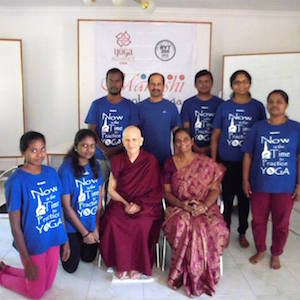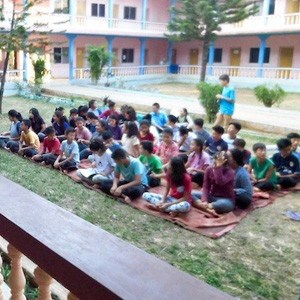Gomchen Lamrim review: Bodhicitta
Part of a series of teachings on the Gomchen Lamrim by Gomchen Ngawang Drakpa. Visit Gomchen Lamrim Study Guide for a full list of contemplation points for the series.
- The definition and types of bodhicitta
- Overview of the bodhisattva path to awakening
- The benefits of bodhicitta
- Generating compassion for those who create great harm in the world
- The causes of bodhicitta
- Putting conventional and ultimate bodhicitta together
Gomchen Lamrim 70 review: Bodhicitta (download)
Contemplation points
The benefits of bodhicitta
This week, we reveiwed some of the benefits of generating bodhicitta (the aspiration to attain Buddhahood for the benefit of all beings). Consider each of these benefits in your meditation. What does meditating on them do for your mind?
- Bodhicitta is a mind that cherishes others, it frees us from the mind that is worried and obsessed with our own happiness; as a bodhisattva, we’d be consumed with whatever brought peace and benefit to the world.
- Bodhicitta is the source of all goodness in the world.
- Bodhicitta alleviates all troubles.
- Bodhicitta is the great path travelled by all the knowledgeable people.
- Bodhicitta is nourishment for all who hear, see, and come into contact with it.
- Bodhicitta is what we are all looking for, the entrance to the greatest spiritual path.
- Because of its vast motivation, the virtue we create under the influence of bodhicitta is immeasurable (even doing a small action like feeding a crumb to an animal becomes a cause for awakening).
- Bodhicitta is the best investment we could ever make, has the greatest return.
- Bodhicitta easily consumes our negativities and fuels the collections of merit and wisdom.
- Bodhicitta grants every wish that any being could ever have or hope for.
The causes for bodhicitta
Think about each of the following causes for bodhicitta. Some things to consider are: What is it about each factor that makes it a cause for bodhicitta? How do these factors benefit you now and in the future? How do they benefit others? Which of these causes are strong in your life? Which ones aren’t so strong? What can you do to cultivate them? Does meditating on them inspire your mind to practice them?
- The desire to have bodhicitta
- Accumulate merit and purify our negativities
- The inspiration of our spiritual mentors
- Live near practitioners of bodhicitta
- Study the texts that describe it
- Hear, think, and meditate on the teachings about bodhicitta
- Remember the qualities of the Buddha
- Value the Mahayana teachings and want them to exist forever
- Cultivate the thought, “If I generate bodhicitta, then I’ll be able to inspire others to do it too!”
- Make requests for the inspiration of the Buddhas and bodhisattvas to help you generate bodhicitta
- Have renunciation and the aspiration for liberation
- Have an understanding of emptiness
- Have an awareness that others’ happiness depends on me
Conclusion: Feel inspired to cultivate these causes that lead to the beautiful aspiration of bodhicitta, the wish to become a fully awakened Buddha for the benefit of all beings. Make a determination and an action plan to cultivate them in your daily life.
Bhikshuni Thubten Jampa
Bhikshuni Thubten Jampa is from Hamburg, Germany. She took refuge in 2001. Bhikshuni Jampa studied politics and sociology for 5 years at the Humboldt-University in Berlin and received her master in Social Science in 2004. Afterwards she worked for the International Campaign for Tibet (ICT) in Berlin till 2007 and for the Tibetan Center Hamburg from 2007-2011. She completed monastic training at Sravasti Abbey, USA from 2011-2022. Today she lives in Hamburg again as a fully ordained nun (Bhikshuni) and studies full-time at the Dharma College at the Tibetan Centre. She occasionally offers lectures, retreats, regular meditations and a study group at the Buddhist Society Hamburg and if requested at the Tibetan Centre, among other places. Bhikshuni Thubten Jampa is also involved in the Hamburg Buddhist Society (BGH).


